Examining Ethical Issues in Collaborative Research Teams & Outcomes
VerifiedAdded on 2023/04/20
|5
|1662
|139
Essay
AI Summary
This essay explores the complex ethical and legal issues arising from collaborative research involving human subjects. It analyzes ethical considerations related to co-authoring, addressing concerns such as guest and ghost authorship, and emphasizes the importance of accountability in medical journals. The essay also discusses the ethical challenges in disseminating research outcomes, highlighting the need for active public engagement and careful consideration of the impact on research participants and their families. Furthermore, it stresses the ethical responsibilities of researchers, including reporting negative outcomes, maintaining commitment to peer review, and ensuring institutional oversight. The essay concludes by underscoring the importance of ethical awareness within research teams and the need for critical reflection throughout the research lifecycle, advocating for research that maximizes benefits while minimizing risks to individuals and society. Desklib offers a wealth of similar essays and solved assignments to aid students in their studies.
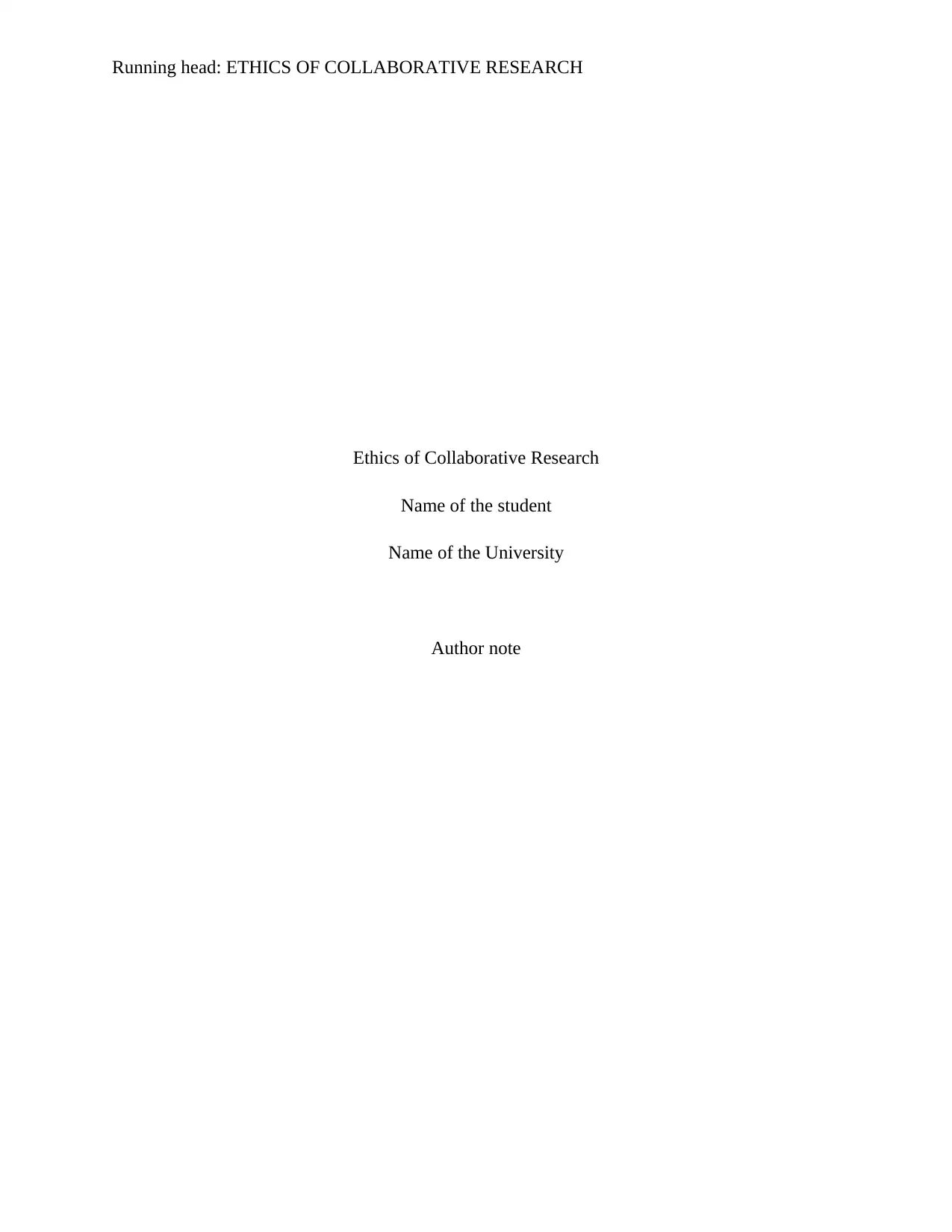
Running head: ETHICS OF COLLABORATIVE RESEARCH
Ethics of Collaborative Research
Name of the student
Name of the University
Author note
Ethics of Collaborative Research
Name of the student
Name of the University
Author note
Paraphrase This Document
Need a fresh take? Get an instant paraphrase of this document with our AI Paraphraser
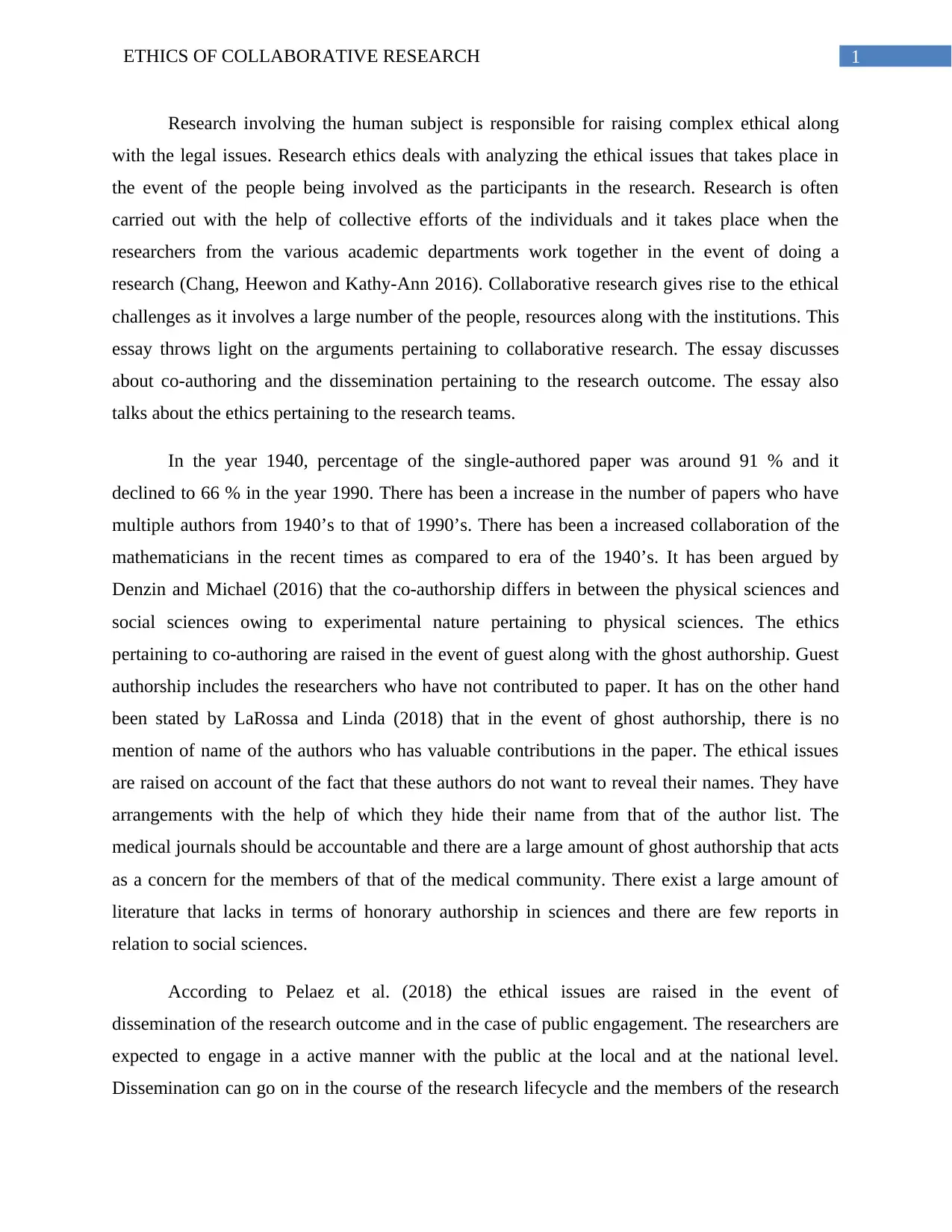
1ETHICS OF COLLABORATIVE RESEARCH
Research involving the human subject is responsible for raising complex ethical along
with the legal issues. Research ethics deals with analyzing the ethical issues that takes place in
the event of the people being involved as the participants in the research. Research is often
carried out with the help of collective efforts of the individuals and it takes place when the
researchers from the various academic departments work together in the event of doing a
research (Chang, Heewon and Kathy-Ann 2016). Collaborative research gives rise to the ethical
challenges as it involves a large number of the people, resources along with the institutions. This
essay throws light on the arguments pertaining to collaborative research. The essay discusses
about co-authoring and the dissemination pertaining to the research outcome. The essay also
talks about the ethics pertaining to the research teams.
In the year 1940, percentage of the single-authored paper was around 91 % and it
declined to 66 % in the year 1990. There has been a increase in the number of papers who have
multiple authors from 1940’s to that of 1990’s. There has been a increased collaboration of the
mathematicians in the recent times as compared to era of the 1940’s. It has been argued by
Denzin and Michael (2016) that the co-authorship differs in between the physical sciences and
social sciences owing to experimental nature pertaining to physical sciences. The ethics
pertaining to co-authoring are raised in the event of guest along with the ghost authorship. Guest
authorship includes the researchers who have not contributed to paper. It has on the other hand
been stated by LaRossa and Linda (2018) that in the event of ghost authorship, there is no
mention of name of the authors who has valuable contributions in the paper. The ethical issues
are raised on account of the fact that these authors do not want to reveal their names. They have
arrangements with the help of which they hide their name from that of the author list. The
medical journals should be accountable and there are a large amount of ghost authorship that acts
as a concern for the members of that of the medical community. There exist a large amount of
literature that lacks in terms of honorary authorship in sciences and there are few reports in
relation to social sciences.
According to Pelaez et al. (2018) the ethical issues are raised in the event of
dissemination of the research outcome and in the case of public engagement. The researchers are
expected to engage in a active manner with the public at the local and at the national level.
Dissemination can go on in the course of the research lifecycle and the members of the research
Research involving the human subject is responsible for raising complex ethical along
with the legal issues. Research ethics deals with analyzing the ethical issues that takes place in
the event of the people being involved as the participants in the research. Research is often
carried out with the help of collective efforts of the individuals and it takes place when the
researchers from the various academic departments work together in the event of doing a
research (Chang, Heewon and Kathy-Ann 2016). Collaborative research gives rise to the ethical
challenges as it involves a large number of the people, resources along with the institutions. This
essay throws light on the arguments pertaining to collaborative research. The essay discusses
about co-authoring and the dissemination pertaining to the research outcome. The essay also
talks about the ethics pertaining to the research teams.
In the year 1940, percentage of the single-authored paper was around 91 % and it
declined to 66 % in the year 1990. There has been a increase in the number of papers who have
multiple authors from 1940’s to that of 1990’s. There has been a increased collaboration of the
mathematicians in the recent times as compared to era of the 1940’s. It has been argued by
Denzin and Michael (2016) that the co-authorship differs in between the physical sciences and
social sciences owing to experimental nature pertaining to physical sciences. The ethics
pertaining to co-authoring are raised in the event of guest along with the ghost authorship. Guest
authorship includes the researchers who have not contributed to paper. It has on the other hand
been stated by LaRossa and Linda (2018) that in the event of ghost authorship, there is no
mention of name of the authors who has valuable contributions in the paper. The ethical issues
are raised on account of the fact that these authors do not want to reveal their names. They have
arrangements with the help of which they hide their name from that of the author list. The
medical journals should be accountable and there are a large amount of ghost authorship that acts
as a concern for the members of that of the medical community. There exist a large amount of
literature that lacks in terms of honorary authorship in sciences and there are few reports in
relation to social sciences.
According to Pelaez et al. (2018) the ethical issues are raised in the event of
dissemination of the research outcome and in the case of public engagement. The researchers are
expected to engage in a active manner with the public at the local and at the national level.
Dissemination can go on in the course of the research lifecycle and the members of the research
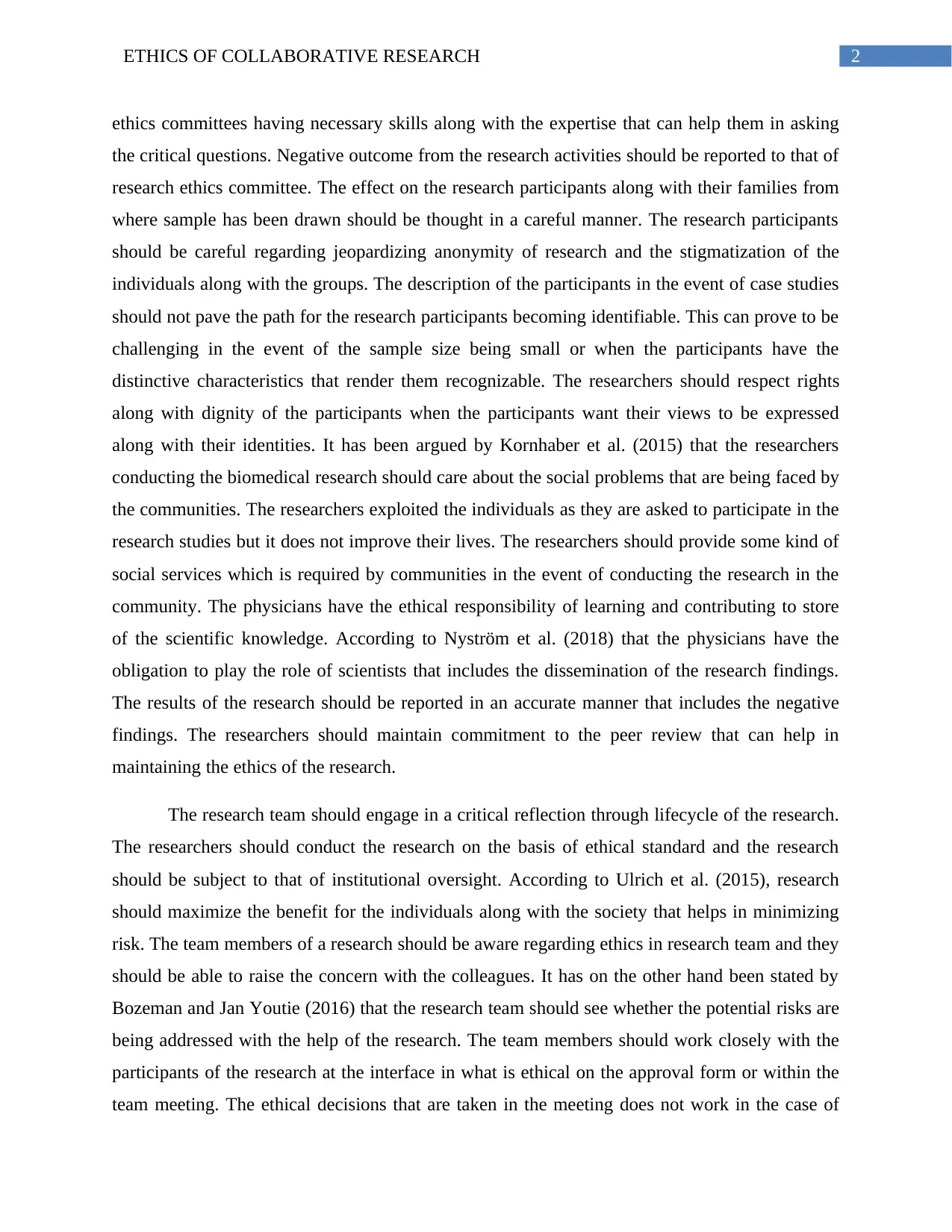
2ETHICS OF COLLABORATIVE RESEARCH
ethics committees having necessary skills along with the expertise that can help them in asking
the critical questions. Negative outcome from the research activities should be reported to that of
research ethics committee. The effect on the research participants along with their families from
where sample has been drawn should be thought in a careful manner. The research participants
should be careful regarding jeopardizing anonymity of research and the stigmatization of the
individuals along with the groups. The description of the participants in the event of case studies
should not pave the path for the research participants becoming identifiable. This can prove to be
challenging in the event of the sample size being small or when the participants have the
distinctive characteristics that render them recognizable. The researchers should respect rights
along with dignity of the participants when the participants want their views to be expressed
along with their identities. It has been argued by Kornhaber et al. (2015) that the researchers
conducting the biomedical research should care about the social problems that are being faced by
the communities. The researchers exploited the individuals as they are asked to participate in the
research studies but it does not improve their lives. The researchers should provide some kind of
social services which is required by communities in the event of conducting the research in the
community. The physicians have the ethical responsibility of learning and contributing to store
of the scientific knowledge. According to Nyström et al. (2018) that the physicians have the
obligation to play the role of scientists that includes the dissemination of the research findings.
The results of the research should be reported in an accurate manner that includes the negative
findings. The researchers should maintain commitment to the peer review that can help in
maintaining the ethics of the research.
The research team should engage in a critical reflection through lifecycle of the research.
The researchers should conduct the research on the basis of ethical standard and the research
should be subject to that of institutional oversight. According to Ulrich et al. (2015), research
should maximize the benefit for the individuals along with the society that helps in minimizing
risk. The team members of a research should be aware regarding ethics in research team and they
should be able to raise the concern with the colleagues. It has on the other hand been stated by
Bozeman and Jan Youtie (2016) that the research team should see whether the potential risks are
being addressed with the help of the research. The team members should work closely with the
participants of the research at the interface in what is ethical on the approval form or within the
team meeting. The ethical decisions that are taken in the meeting does not work in the case of
ethics committees having necessary skills along with the expertise that can help them in asking
the critical questions. Negative outcome from the research activities should be reported to that of
research ethics committee. The effect on the research participants along with their families from
where sample has been drawn should be thought in a careful manner. The research participants
should be careful regarding jeopardizing anonymity of research and the stigmatization of the
individuals along with the groups. The description of the participants in the event of case studies
should not pave the path for the research participants becoming identifiable. This can prove to be
challenging in the event of the sample size being small or when the participants have the
distinctive characteristics that render them recognizable. The researchers should respect rights
along with dignity of the participants when the participants want their views to be expressed
along with their identities. It has been argued by Kornhaber et al. (2015) that the researchers
conducting the biomedical research should care about the social problems that are being faced by
the communities. The researchers exploited the individuals as they are asked to participate in the
research studies but it does not improve their lives. The researchers should provide some kind of
social services which is required by communities in the event of conducting the research in the
community. The physicians have the ethical responsibility of learning and contributing to store
of the scientific knowledge. According to Nyström et al. (2018) that the physicians have the
obligation to play the role of scientists that includes the dissemination of the research findings.
The results of the research should be reported in an accurate manner that includes the negative
findings. The researchers should maintain commitment to the peer review that can help in
maintaining the ethics of the research.
The research team should engage in a critical reflection through lifecycle of the research.
The researchers should conduct the research on the basis of ethical standard and the research
should be subject to that of institutional oversight. According to Ulrich et al. (2015), research
should maximize the benefit for the individuals along with the society that helps in minimizing
risk. The team members of a research should be aware regarding ethics in research team and they
should be able to raise the concern with the colleagues. It has on the other hand been stated by
Bozeman and Jan Youtie (2016) that the research team should see whether the potential risks are
being addressed with the help of the research. The team members should work closely with the
participants of the research at the interface in what is ethical on the approval form or within the
team meeting. The ethical decisions that are taken in the meeting does not work in the case of
⊘ This is a preview!⊘
Do you want full access?
Subscribe today to unlock all pages.

Trusted by 1+ million students worldwide
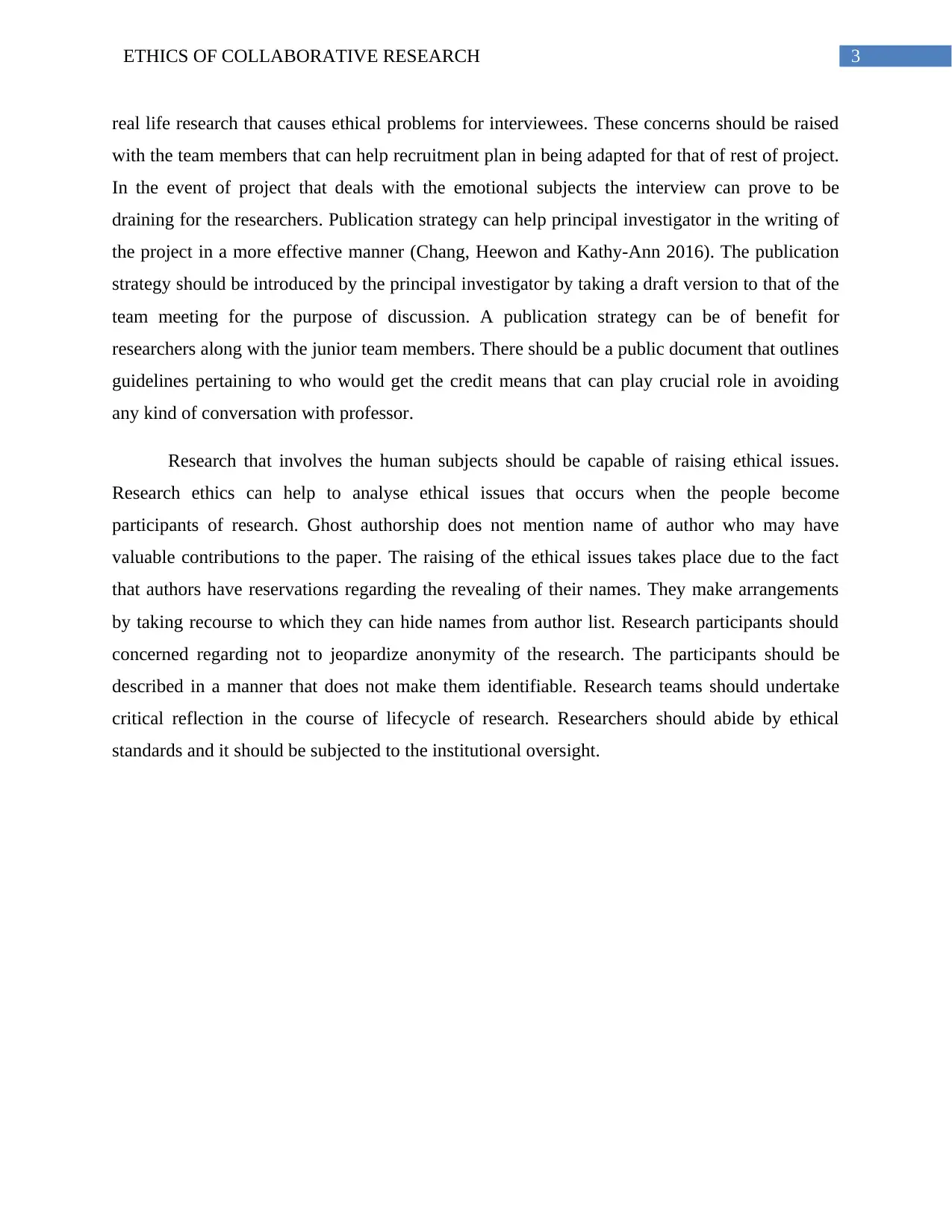
3ETHICS OF COLLABORATIVE RESEARCH
real life research that causes ethical problems for interviewees. These concerns should be raised
with the team members that can help recruitment plan in being adapted for that of rest of project.
In the event of project that deals with the emotional subjects the interview can prove to be
draining for the researchers. Publication strategy can help principal investigator in the writing of
the project in a more effective manner (Chang, Heewon and Kathy-Ann 2016). The publication
strategy should be introduced by the principal investigator by taking a draft version to that of the
team meeting for the purpose of discussion. A publication strategy can be of benefit for
researchers along with the junior team members. There should be a public document that outlines
guidelines pertaining to who would get the credit means that can play crucial role in avoiding
any kind of conversation with professor.
Research that involves the human subjects should be capable of raising ethical issues.
Research ethics can help to analyse ethical issues that occurs when the people become
participants of research. Ghost authorship does not mention name of author who may have
valuable contributions to the paper. The raising of the ethical issues takes place due to the fact
that authors have reservations regarding the revealing of their names. They make arrangements
by taking recourse to which they can hide names from author list. Research participants should
concerned regarding not to jeopardize anonymity of the research. The participants should be
described in a manner that does not make them identifiable. Research teams should undertake
critical reflection in the course of lifecycle of research. Researchers should abide by ethical
standards and it should be subjected to the institutional oversight.
real life research that causes ethical problems for interviewees. These concerns should be raised
with the team members that can help recruitment plan in being adapted for that of rest of project.
In the event of project that deals with the emotional subjects the interview can prove to be
draining for the researchers. Publication strategy can help principal investigator in the writing of
the project in a more effective manner (Chang, Heewon and Kathy-Ann 2016). The publication
strategy should be introduced by the principal investigator by taking a draft version to that of the
team meeting for the purpose of discussion. A publication strategy can be of benefit for
researchers along with the junior team members. There should be a public document that outlines
guidelines pertaining to who would get the credit means that can play crucial role in avoiding
any kind of conversation with professor.
Research that involves the human subjects should be capable of raising ethical issues.
Research ethics can help to analyse ethical issues that occurs when the people become
participants of research. Ghost authorship does not mention name of author who may have
valuable contributions to the paper. The raising of the ethical issues takes place due to the fact
that authors have reservations regarding the revealing of their names. They make arrangements
by taking recourse to which they can hide names from author list. Research participants should
concerned regarding not to jeopardize anonymity of the research. The participants should be
described in a manner that does not make them identifiable. Research teams should undertake
critical reflection in the course of lifecycle of research. Researchers should abide by ethical
standards and it should be subjected to the institutional oversight.
Paraphrase This Document
Need a fresh take? Get an instant paraphrase of this document with our AI Paraphraser
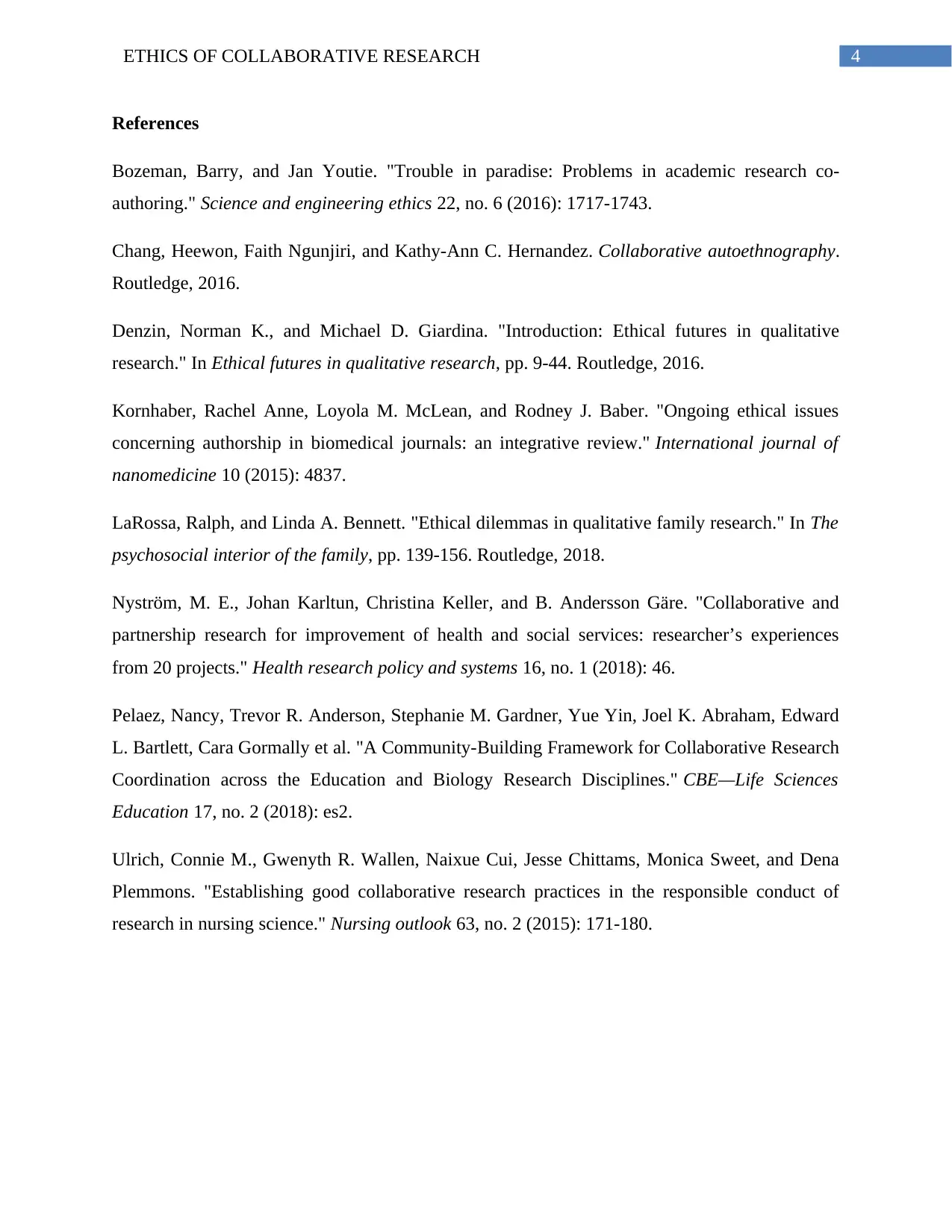
4ETHICS OF COLLABORATIVE RESEARCH
References
Bozeman, Barry, and Jan Youtie. "Trouble in paradise: Problems in academic research co-
authoring." Science and engineering ethics 22, no. 6 (2016): 1717-1743.
Chang, Heewon, Faith Ngunjiri, and Kathy-Ann C. Hernandez. Collaborative autoethnography.
Routledge, 2016.
Denzin, Norman K., and Michael D. Giardina. "Introduction: Ethical futures in qualitative
research." In Ethical futures in qualitative research, pp. 9-44. Routledge, 2016.
Kornhaber, Rachel Anne, Loyola M. McLean, and Rodney J. Baber. "Ongoing ethical issues
concerning authorship in biomedical journals: an integrative review." International journal of
nanomedicine 10 (2015): 4837.
LaRossa, Ralph, and Linda A. Bennett. "Ethical dilemmas in qualitative family research." In The
psychosocial interior of the family, pp. 139-156. Routledge, 2018.
Nyström, M. E., Johan Karltun, Christina Keller, and B. Andersson Gäre. "Collaborative and
partnership research for improvement of health and social services: researcher’s experiences
from 20 projects." Health research policy and systems 16, no. 1 (2018): 46.
Pelaez, Nancy, Trevor R. Anderson, Stephanie M. Gardner, Yue Yin, Joel K. Abraham, Edward
L. Bartlett, Cara Gormally et al. "A Community-Building Framework for Collaborative Research
Coordination across the Education and Biology Research Disciplines." CBE—Life Sciences
Education 17, no. 2 (2018): es2.
Ulrich, Connie M., Gwenyth R. Wallen, Naixue Cui, Jesse Chittams, Monica Sweet, and Dena
Plemmons. "Establishing good collaborative research practices in the responsible conduct of
research in nursing science." Nursing outlook 63, no. 2 (2015): 171-180.
References
Bozeman, Barry, and Jan Youtie. "Trouble in paradise: Problems in academic research co-
authoring." Science and engineering ethics 22, no. 6 (2016): 1717-1743.
Chang, Heewon, Faith Ngunjiri, and Kathy-Ann C. Hernandez. Collaborative autoethnography.
Routledge, 2016.
Denzin, Norman K., and Michael D. Giardina. "Introduction: Ethical futures in qualitative
research." In Ethical futures in qualitative research, pp. 9-44. Routledge, 2016.
Kornhaber, Rachel Anne, Loyola M. McLean, and Rodney J. Baber. "Ongoing ethical issues
concerning authorship in biomedical journals: an integrative review." International journal of
nanomedicine 10 (2015): 4837.
LaRossa, Ralph, and Linda A. Bennett. "Ethical dilemmas in qualitative family research." In The
psychosocial interior of the family, pp. 139-156. Routledge, 2018.
Nyström, M. E., Johan Karltun, Christina Keller, and B. Andersson Gäre. "Collaborative and
partnership research for improvement of health and social services: researcher’s experiences
from 20 projects." Health research policy and systems 16, no. 1 (2018): 46.
Pelaez, Nancy, Trevor R. Anderson, Stephanie M. Gardner, Yue Yin, Joel K. Abraham, Edward
L. Bartlett, Cara Gormally et al. "A Community-Building Framework for Collaborative Research
Coordination across the Education and Biology Research Disciplines." CBE—Life Sciences
Education 17, no. 2 (2018): es2.
Ulrich, Connie M., Gwenyth R. Wallen, Naixue Cui, Jesse Chittams, Monica Sweet, and Dena
Plemmons. "Establishing good collaborative research practices in the responsible conduct of
research in nursing science." Nursing outlook 63, no. 2 (2015): 171-180.
1 out of 5
Related Documents
Your All-in-One AI-Powered Toolkit for Academic Success.
+13062052269
info@desklib.com
Available 24*7 on WhatsApp / Email
![[object Object]](/_next/static/media/star-bottom.7253800d.svg)
Unlock your academic potential
Copyright © 2020–2026 A2Z Services. All Rights Reserved. Developed and managed by ZUCOL.





